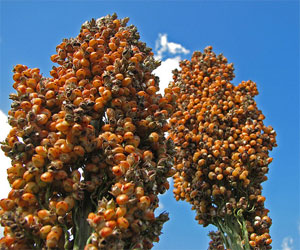Ceres has begun harvesting new switchgrass and sorghum seeds for its first foray into the biofuel-feedstock market, the company told Greentech Media this week. At a biofuel seminar with General Motors Corp. at Ceres’ headquarters in Thousand Oaks, Calif., the company’s business development manager, Spencer Swayze, said Ceres plans to put the seeds on sale on time for the spring planting season in the United States.
The seeds, which will be marketed under the Blade Bioenergy Crops brand, will come from plants in Texas and the Midwest that have been cross-bred for traits, such as drought resistance and high growth rates, intended to produce more of the crops.
 High oil prices and policies including last year’s energy bill, which requires the country to produce 36 billion gallons of biofuels by 2022, have boosted the market for fuel from plants and other organic materials. “This industry has reached a critical mass,” Ceres CEO Richard Hamilton said as he presented a slide filled with names of biofuel companies developing manufacturing facilities. Hamilton hosted a biofuel seminar with General Motors at the Ceres headquarters Thursday.
High oil prices and policies including last year’s energy bill, which requires the country to produce 36 billion gallons of biofuels by 2022, have boosted the market for fuel from plants and other organic materials. “This industry has reached a critical mass,” Ceres CEO Richard Hamilton said as he presented a slide filled with names of biofuel companies developing manufacturing facilities. Hamilton hosted a biofuel seminar with General Motors at the Ceres headquarters Thursday.
Ceres, which has years of experience sequencing and analyzing plant genes and engineering crops, is among a growing number of biotech companies entering the biofuel field. It raised $75 million in September to expanding into the biofuel market. Other biotech companies, such as Athenix Corp. and Performance Plants, also have recently raised cash. Athenix, located in Research Triangle Park in North Carolina, last week raised $10 million in its fourth round of funding to develop genes, proteins and microbes for converting biomass into ethanol. Canadian company Performance Plants last week also received C$13 million ($14.79 million) to breed hardier switchgrass and other plants for biofuels.
Biotech companies have been working for years to try to bring new energy crops to the biofuel market. In Ceres’ case, its researchers have used marker-assisted breeding technology to identify desirable genetic markers and cross-breed plants with those markers to produce varieties that carry those preferred traits.
The company has been developing its first two energy crops, switchgrass and sorghum, with several research partners, including Texas A&M University, the Samuel Roberts Noble Foundation in Ardmore, Oklahoma, and South Dakota State University. It also has worked with researchers from the U.S. Department of Agriculture.
Ceres will sell seeds for two switchgrass varieties developed by its researchers, as well as seeds for three other types of switchgrass cultivated by the USDA, said Ceres spokesman Gary Koppenjan. The company has bred the different types to suit different regional climates. Ceres’ own seeds could produce 10 tons of switchgrass per acre, doubling the potential production from the USDA seeds, Koppenjan said.
Switchgrass is a hardy, perennial plant that is native to the prairies of North America. Historically, it’s been used for livestock grazing and erosion control, but a number of companies view the grass as good potential feedstock for cellulosic ethanol. In 2006, Ceres announced that it had completed analyzing more than 12,000 switchgrass genes.
The company also has been developing hybridized sorghum. Humans have been planting sorghum for its grain, which is used for food and producing ethanol. But Ceres and Texas A&M researchers are developing sorghum varieties to make use of their stems, stalks and leaves for fuel production. Ceres plans to sell seeds for two sorghum varieties this fall.
The company said it has lined up customers for its switchgrass and sorghum seeds, but declined to name them.
Cellulosic-ethanol companies have struggled to distinguish themselves from ethanol producers that use corn or other food sources to make fuels. Critics have said using corn to make fuels has driven up prices for the global corn market, making the staple too expensive for developing countries.
Although cellulosic-ethanol companies don’t use food crops, their need for an abundant supply of feedstock could lead farmers to plant energy crops rather than food crops, according to critics such as Earth Policy Institute President Lester Brown. But Hamilton said the criticism is misplaced, arguing that rising food prices are tied to increasing oil costs, not to ethanol. He noted in his presentation Thursday that the United States has continued to increase its exports of soybeans and other crops, and added that more arable land is available for farming.
Source
Supplier
Athenix Corp.
Ceres Inc.
Earth Policy Institute
General Motors
Performance Plants
Samuel Roberts Noble Foundation
South Dakota State University
Texas A&M University
US Department of Agriculture (USDA)
Share
Renewable Carbon News – Daily Newsletter
Subscribe to our daily email newsletter – the world's leading newsletter on renewable materials and chemicals












